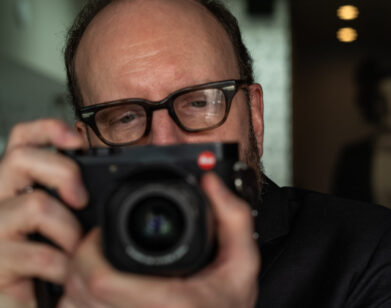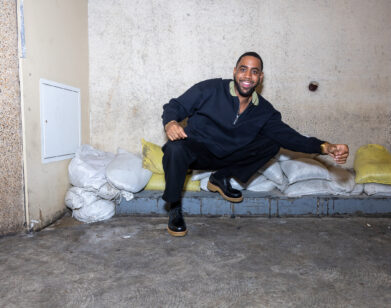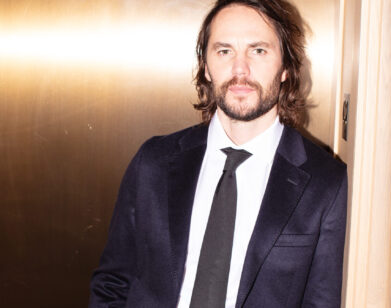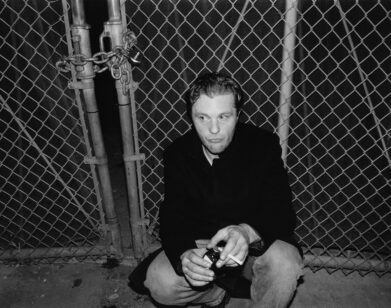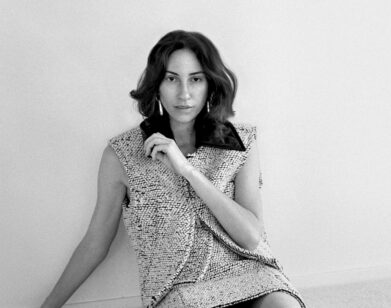Rough Character
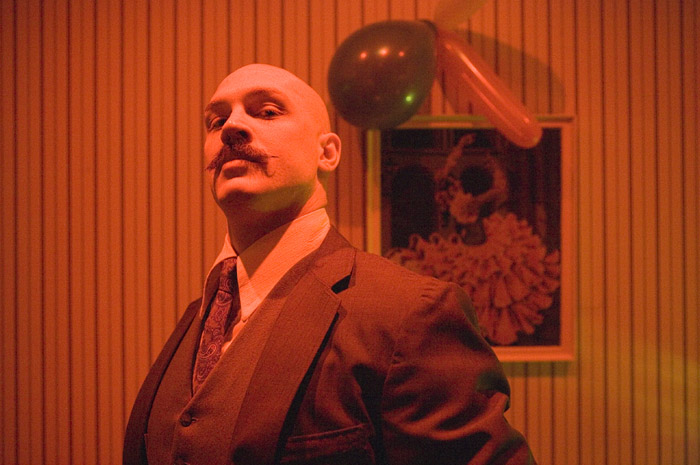
Transformation is the name of the game if you’re an actor, even though far too many of them let the makeup, wardrobe, and special effects teams do most of the heavy lifting. But every once in a while you discover someone who can literally transform, at a moment’s notice, before your eyes. Such is the case with Tom Hardy. Last summer, the 32 year-old Brit, who’s also made a name for himself in the UK for his radical physical transformations (see Stuart: A Life Backwards), was in New York promoting his then-upcoming film, RocknRolla, in which he played a gay getaway driver opposite Gerard Butler. Though Hardy delivered a deft and daring turn in the Guy Ritchie heist romp, all he really wanted to talk about was his passion project, Bronson, which came out Friday after a long, celebrated run on the festival circuit. So the next day I followed him to an ADR session, where he spent the next eight hours transitioning seamlessly from telling sentimental stories about his old dog Max and newborn son Louis to frothing, screaming, swearing, and becoming the caged animal that is Charlie Bronson, Britain’s most violent criminal. (PHOTO: TOM HARDY IN BRONSON, COURTESY OF MAGNET RELEASING)
Born Michael Peterson, until his East London fight promoter changed it as a nod to the Death Wish star, Bronson has been in prison for 34 years (28 of them in a soul-crushing solitary confinement) and paroled for just 111 days during that time. Though he’s never killed anyone, as the BBC reports, “he’s spent time in 120 different prisons, staged eight rooftop protests, assaulted more than 20 prison officers and caused £500,000 worth of damage to property.” During that time he’s also published 10 books, won prizes for his poetry, had his drawings sold in galleries across the globe, and incited various Hurricane Carter-like Free Bronson movements along the way. In other words, the man is simply too valuable to be released, which has made him all but impossible for an actor to mimic. Until now, that is. “I was intrigued by the case study and meeting Bronson, talking to him, doing a bit of investigative journalism and then finding a piece and forming a character,” says Hardy, who’s currently on a globe-trotting shoot for Christopher Nolan’s Inception. “I’ve tried to create a performance version of the real man and then put him in the film Nicolas Winding Refn aesthetically wanted to shoot, an unorthodox biography of a man.”
Four years in the making, Bronson is a manic tour into the exotic violence that makes for a legendary, if clownishly sad, prison icon. And judging from the critical gushing (“A Clockwork Orange for the 21st Century”), his upcoming film about a broken Marine-UFC fighter (Warrior), and the list of directors he’s currently–or about to–work with (from Christopher Nolan to Tony Scott to Phillip Seymour Hoffman) there’s a good chance it will allow Hardy to finally make the transition from UK to major Hollywood stardom, despite his reservations. “As soon as people recognize who I am I’m kind of done for being able to transform,” he says. “The best thing about being anonymous is to be anonymous from role to role. It would be great to get as many films under my belt before people link up who I am. Because once you break it’s over.”
MICHAEL SLENSKE: How are you?
TOM HARDY: I’m good, I’m good, I’m just tired. We got to LA yesterday and I’ve been up since five working and I got to get up again at five tomorrow. Just trying to get my head wrapped around all the lines I have to learn.
SLENSKE: This is the Chris Nolan movie?
HARDY: Yeah, it’s a fucking cool movie.
SLENSKE: What’s your character?
HARDY: I’m not allowed to talk about it, we all had to sign secret stuff, and I can’t talk about anything, but it’s a good character.
SLENSKE: Where are you filming?
HARDY: It’s all over the place, we’ve shot in England, Paris, Morocco, Los Angeles, Japan, and Calgary coming up. It’s about four or five months. It’s about $150 million.
SLENSKE: What’s Chris like to work with?
HARDY: He’s brilliant. It’s a big ensemble, obviously Leo is leading it, there’s loads of people in it. Chris Nolan and his team are so unbelievably relaxed and efficient. It’s a $150 million and this man knows exactly what he’s shooting. On set it’s just such a very relaxed environment. In Morocco we shot everything and came back a day early. We got five pages done in one morning. He’s very studious, very straight, clean, sharp. I keep having to pinch myself because I don’t feel like I’m working hard enough, like I’ll be exposed, “You’re not the right person, we didn’t want Tom Hardy we want someone else. Go, back to London.”
SLENSKE: You’ve done a lot of these physical transformations. Did you have to assume a new body for this one?
HARDY: This one has calmed down a notch. I spent five months training [for Warrior], I broke my ribs, I broke my foot, I tore ligaments in my right hand, and I took a real smashing. Before that I did this gangster film, The Take, for Sky. I got fat after Bronson, I got chunky, it’s the inevitable too many lattes, too much sugar, no training. But that’s the way. Bodies aren’t meant to do that much growing. And now I’ve just let myself go again. I’m not fat, but I’m not training.
SLENSKE: Tell me about Warrior.
HARDY: Dude, that’s dope, man. It’s going to be out next July and it’s about two brothers and their father and their mother and they haven’t spoken to each other in years and they end up in a UFC tournament together in a fight situation. We were in Pittsburgh. It was great, the people were awesome, but the movie was really intense, just an unbelievable training schedule. I got a bit lost in that character, more so than Bronson.
SLENSKE: And your guy is sort of down and out and returns to the sport?
HARDY: My guy comes back from Iraq. He’s a Marine and he sort of fights to keep his brain quiet. It’s about a dysfunctional family, and the other brother is a teacher and he goes back to fight because he’s in debt and the old man is a recovering alcoholic and the whole family hasn’t been together for about 15 years and the two brothers end up in the tournament, they don’t speak, and they end up fighting each other.
SLENSKE: Did you have to do a massive amount of training for that?
HARDY: Yeah, I started training in December when I was doing another film and we trained all the way through to shooting, six weeks straight fighting with Nate Marquardt who’s a middleweight for the UFC, Anthony Rumble Johnson, who’s another middleweight for the UFC, Yves Edwards from Pride. It was the most intense seven-day-a-week training and then we trained all the way through the first two months of shooting as well til we actually got into the ring. It was pretty intense, a step up from Bronson on fighting. The choreography was really to the letter, and it wasn’t originally backed by the UFC.
SLENSKE: Really, tougher than Bronson?
HARDY: Yeah, much more fight-oriented then Bronson. Bronson was more violence.
SLENSKE: But you were doing some crazy training for that too, like 2500 push-ups a day?
HARDY: No, Charlie does 2500 push-ups a day, I didn’t do that. I had to put on a lot of weight as quick as possible and I only had five weeks to do it, and a lot of that was fat. I ate everything. To be honest, I lost about 14 pounds of fat on this last film, and gained 28 pounds of muscle. I was heavier than I was on Bronson.
SLENSKE: So when we were in that ADR session you told me the whole film had taken four years?
HARDY: From conception and when I first met the guys with the script. It belonged to another director at that point, and the producer then took it to Vertigo. Then it went to Nicolas Winding Refn, and he didn’t like me, I didn’t like him, and he offered the film to someone else. Then a year later he came back to me and I started writing to Charlie. Charlie got very angry because he thought I didn’t want to play him and that wasn’t the case at all, and he demanded to see me and I ended up calling his sister and got in touch with the family and then I started visiting him for two years and then the story slowly got financing.
SLENSKE: Did you ever make amends with the director?
HARDY: Oh, yeah, we just didn’t see eye to eye as human beings. We just rubbed each other the wrong way and continued to rub each other the wrong way.
SLENSKE: But it seems like it worked.
HARDY: Yeah, it’s often the way with collaborations when you work with desperately individual people and then put them together as a team there are going to be fireworks or disgruntlement and we had our fair share of disagreements, but having said that I loved working with Nic and I would love to work with him again. I know that I’m going to have an argument with him, but I wouldn’t have it any other way. He challenges me and I like to think I challenge him. And the team he chose is fucking awesome and I think we came up with a good piece of film.
SLENSKE: Has Charlie seen it?
HARDY: No, he hasn’t seen it and he’s actually been subjugated to further punishment because of the film. He was due to be paroled. He had a parole hearing and we all thought he was probably going to get released soon in the near future, but once the film died down they moved him to a further maximum security prison and took away his privileges.
SLENSKE: Where is he now?
HARDY: I don’t know exactly. Whitemoor, or somewhere in the Midlands. They’ve moved him to a really shitty prison now, taken away all his art materials, there’s not even a lid on his toilet and there was no water and he’s had all his possessions taken off him because there was a tape, which was on the DVD as well, of him speaking that was smuggled out of the prison by “somebody” and it was played at the premiere and it’s on the DVD and the prison services used that as an indication of him still not playing the game and we’re all banned from seeing him. I’m never allowed to visit him and so are several other members of the film crew.
SLENSKE: Can you talk to him at all?
HARDY: I can’t talk to him or write to him.
SLENSKE: You can’t even write to him?
HARDY: Not at the moment. Only through his lawyer. He’s got a new one, she wrote to me just recently. I’ve been in Pittsburgh most of the year so I only got back to her. It’s pretty hard to get in touch with him and keep an eye on what’s going on while I’m out of the country.
SLENSKE: So is there still an effort to help him?
HARDY: Of course, but Charlie’s in a position right now where he has to really help himself out and they’ve made it quite clear to him that you have to participate in psychological analysis within the prison system. Best thing for me is I just can’t rock the boat because as an actor, I’m his friend yes and I could go out and stomp my feet and speak to various people about it, but I don’t know if that would actually help him. It might seem like I’m making a cause out of it, and again, it wouldn’t help him. So at the moment my hands are a bit tied as to what the next step is, but the main thing is to get to visit him again. I don’t know what that entails so I’m writing his lawyer. But it’s all a bit quiet, post-film.
SLENSKE: What’s your next project then?
HARDY: There’s an untitled Tony Scott film about the New Jersey mob that’s got a really interesting potential lineup. Nothing guaranteed, but some names have expressed interest like Javier Bardem and Chris Walken and Gene Hackman and Mickey Rourke.
SLENSKE: Is it a true story?
HARDY: No, but it’s from the same guy who wrote Sexy Beast. It is wicked and it’s Tony Scott’s passion project really, and it is fucking formidable, and I’ve been looking forward to that. I may also be doing The Long Red Road in Chicago with Phillip Seymour Hoffman directing.
SLENSKE: What’s that again?
HARDY: The Long Red Road is a story about alcoholism and dysfunction and tragic tale of a man who’s trying to drink himself to death on an Indian reservation in Dakota. It was written for me, so it’s something I would love to do.
SLENSKE: There’s something about these broken characters you seem to gravitate towards?
HARDY: There’s something that appeals entirely to me about dysfunction that I can relate to, but more human than something that is hopeless. No matter how dark they get there’s always hope as opposed to something that’s just dark for the sake of being dark. I don’t think that’s very interesting.
SLENSKE: How’s your boy?
HARDY: Oh, he’s lovely, he’s 18 months. He’s at home with his mom. I’m not with his mom anymore, but I’ve got to get out on the road and make sure the money’s there so I can take time off and spend months on end with him. Nothing makes me fatter or happier than his face when he smiles and gives me a cuddle.
SLENSKE: Are you going back to London after the Nolan film?
HARDY: Yeah, as a single dad now I have to compensate when I’m away. I love what I do but nothing is more important than my son. I just can’t have him with me all the time. But he loves his mom, and little boys should be with their mommies. Then I can come back and spend days and days on end with him.
SLENSKE: So are you ready to be in the US now?
HARDY: Um, at the moment my work is coming in the US, and I’m loving it, and right now the only drawback is my little boy. Now it’s a question of a doing an American career. I’ve got to start from scratch again. I can always go back to England and work but the real ballpark is the American circuit. Moving up the ladder here is a very different ball game. I’ve always wanted in vain to play for the international squad so we’ll see what we can do.
SLENSKE: So it’s only a matter of months before we catch you in US Weekly?
HARDY: What is that some terrible tabloid. [Laughs]. I don’t know about that, we’ll see.
Bronson is now playing in select theaters.

